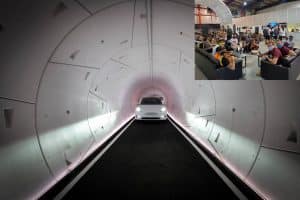- 🚗 Tesla Model 3 crowned as UK’s most efficient EV after being tested by What Car?
- 🔋 The test involved the Tesla Model 3 RWD and 11 other electric vehicles, including a 9-year-old Tesla Model S.
- ⚡ The Tesla Model 3 RWD averaged 4.4 miles per kWh, outperforming other models like the Audi Q6 e-tron.
- 💸 With its efficiency, the Tesla Model 3 could save drivers roughly £237 every 10,000 miles compared to less efficient models.
- 🕰️ A 9-year-old Tesla Model S proved competitive, outlasting newer models like the Peugeot e-308 SW and Mini Cooper SE.
The Tesla Model 3 has redefined what it means to be an efficient electric vehicle (EV), particularly within the competitive UK market. Recently crowned as the UK’s most efficient EV by the respected motoring publication, What Car?, the Model 3’s performance sets a new standard for range and economy. This blog post delves into the details of the efficiency test, the findings, and what this means for drivers considering an electric vehicle.
A Comprehensive Efficiency Test
Participants in the Test
The What Car? efficiency test was a thorough evaluation involving 12 electric vehicles. Among them were:
- Tesla Model 3 Rear Wheel Drive (RWD)
- Audi Q6 e-tron Launch Edition
- A 9-Year-Old Tesla Model S
- Peugeot e-308 SW
- Mini Cooper SE
The inclusion of both new and aged models provided a robust comparison across different manufacturers and age groups.
Methodology
The test measured how far each vehicle could travel on a full charge, establishing efficiency through the metric of miles per kilowatt-hour (kWh). Each vehicle was driven until the battery depleted, allowing for a real-world comparison of range and energy use.
Key Findings and Their Implications
Outstanding Performance by the Tesla Model 3
- Efficiency Results: The Tesla Model 3 RWD emerged as the winner, averaging an impressive 4.4 miles per kWh.
- Comparison Highlights: This dwarfed the performance of competing models, such as the Audi Q6 e-tron, which managed only 3.0 miles per kWh.
Cost Savings
Efficiency translates directly into savings for the consumer. According to the test estimates:
- Tesla Model 3: Drivers could spend approximately £508 on electricity every 10,000 miles.
- Audi Q6 e-tron: In contrast, the Q6 e-tron would cost around £745 for the same mileage.
- Potential Savings: Choosing a Tesla Model 3 could save drivers about £237 every 10,000 miles.
Legacy Performance: The Tesla Model S
Interestingly, the nine-year-old Tesla Model S, with over 250,000 miles on the odometer, outperformed newer models like the Peugeot e-308 SW and Mini Cooper SE, traveling 213 miles on a single charge. This highlights the durability and continuing efficiency of Tesla’s older models.
Why Efficiency Matters Now More Than Ever
According to Steve Huntingford, editor at What Car?, rising energy prices have shifted consumer focus to efficiency. While electric vehicles have traditionally been cheaper to run than their petrol or diesel counterparts, the growing cost of electricity means that maximizing efficiency is crucial for cost-effective commuting.
Conclusion: A Strong Case for the Tesla Model 3
The recent accolade from What Car? underscores the Tesla Model 3’s position as not just a modern innovation but a practical and economical choice for UK drivers. With significant savings potential and robust performance compared to competitors, it offers an appealing option for those looking to transition to an electric vehicle.





